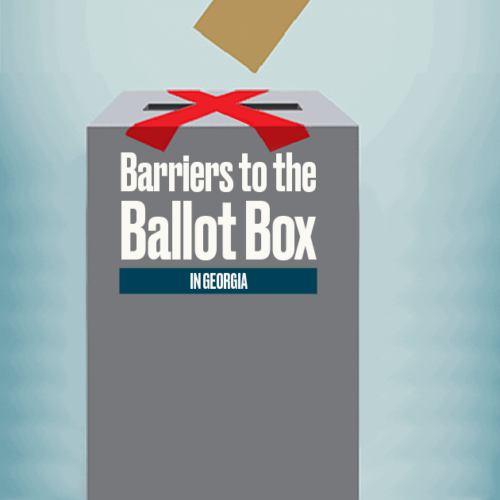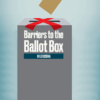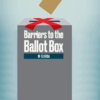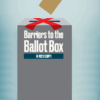Introduction
Georgia was infamous in the last century for its Jim Crow-era poll taxes and other intimidation tactics used to suppress Black citizens’ right to vote. This century, the state is known as an epicenter for battles over restrictive policies that civil-rights activists denounce as modern-day voter suppression.
Eyes are on Georgia because of its reputation — and because strong Democratic turnout for a June primary and a close gubernatorial election in 2018 have boosted the party’s hope that red-state Georgia could become a battleground state for the presidency on Nov. 3.
Sign up for The Moment newsletter
Our CEO Susan Smith Richardson guides you through conversations and context on race and inequality.
Georgia is one of 18 states that require voters to show a photo ID to cast a ballot. Voters must also pay postage to both request and send mail-in ballots, which must arrive before 7 p.m. on Election Day. This year the state fought — and defeated — lawsuits arguing that, because COVID-19 increases risks of in-person voting, the state should assume costs for mailing in ballots and extend the deadline for receiving them.
Georgia also mandates some of the country’s most aggressive methods for purging voters from registration rolls. Republican election officials claim these tactics are crucial to prevent fraud, but have shown almost no evidence of fraud. Voting rights advocates say there is evidence, on the other hand, that Georgia’s methods of questioning voters’ eligibility and purging them have disenfranchised Black and other voters of color.
The Associated Press found that most of the 54,000 people whose voter registrations were held up by state election officials for various eligibility questions in 2018 were Black. The AP also talked to a voter who was showing college students how to check their registration online. She discovered with just days to go before a deadline to register for Georgia’s 2018 gubernatorial election that she’d been dropped from rolls. Last year, a federal judge ruled against Fair Fight, a voting-rights group that challenged the constitutionality of purging more than 100,000 voters under Georgia’s “use it or lose it” law.
The law removes voters the state says don’t vote frequently enough to meet a Georgia requirement, or who fail to come forward to affirm eligibility to remain registered.
Georgia adopted the policy in the early 1990s despite warnings from the U.S Justice Department that it could disproportionately harm Black voters. The state’s practice goes beyond removing voters who’ve died, moved, are serving prison time due to felony convictions, or haven’t paid civil fines.
A 2017 Supreme Court ruling upheld “use it or lose it” laws in nine states.
“These [voter fraud] concerns rose precipitously only after the African-American electorate had reached record-breaking turnout in 2008,” said Sean Young, legal director for the American Civil Liberties Union of Georgia. “Why did these concerns spike only after people of color started voting in unprecedented numbers?
“It’s unreasonable to suggest that voters who have exercised their First Amendment right not to vote should lose that right to vote,” Young said.
Black voter registration in Georgia increased 30% between 2006 and 2008, the year that Barack Obama won the presidency, Atlanta’s WABE radio, Reveal and the American Public Media radio network noted in a joint investigation. Latino registration increased 69%, and Asian-American registration 44%.
Controversy over purging and other practices hangs over the Nov. 3 general election as a record number of Georgia residents are lining up for in-person early voting, which started Oct. 12 and ends Oct. 30. With its fast-growing population, Georgia voter registration has surged. And the COVID-19 pandemic has led to a record number of voters requesting mail-in ballots.
Big purges after ruling
In 2013, a Supreme Court decision invalidated parts of the 1965 Voting Rights Act, freeing Georgia from pre-clearance by the U.S. Justice Department to change certain election rules. After the decision, local consolidation of polling places often justified by budget concerns began escalating, cutting polling places statewide by almost 10%, according to an analysis by Georgia Public Broadcasting and Pro Publica.
Georgia’s then Secretary of State Brian Kemp, a Republican, also began escalating purges of the state’s voter rolls after the 2013 court ruling. Under the policy, state election officials sent voters who hadn’t cast a ballot for three years a notice that they could be removed from the rolls. If they didn’t respond to renew their registration or didn’t vote in two subsequent elections, they’d be purged. The process took seven years.
In one day in 2017, while Kemp was still secretary of state and running for governor, his office removed more than half a million voters from the rolls.
American Public Media estimated that at least 107,000 voters were dumped because of the “use it or lose it” policy. Kemp won his race for governor in 2018, defeating Democrat Stacey Abrams by fewer than 55,000 votes.
Kemp faced an uproar against his purging practices. As governor, he signed a bill in 2019 extending the period before a voter can be purged from seven to nine years and added a mandate that officials send voters in danger of removal a second notice.
American Public Media profiled a purged Black voter stunned to find he wasn’t registered when he went to vote in 2018. Reporters also found purging fell more heavily on Democratic-leaning communities. After her defeat, Abrams founded Fair Fight, the voter-rights group that unsuccessfully went to court to fight a mass purge in 2019. Although the group lost the battle last year over the constitutionality of the purge, it was able to restore some 22,000 voters to the rolls.
Water bills as purge tool
The ACLU of Georgia has challenged other barriers to voting. The group successfully fought closures of polling places in Black communities and ended some local jurisdictions’ practice of threatening to purge voters if officials suspected they didn’t live at residences because their names weren’t on local water bills. Georgia allows local election officials to scrutinize voters’ eligibility and cancel their registration. Voters have also been flagged for purging because their addresses were “transitional housing” for people struggling to overcome homelessness or residing in such residences to avoid psychiatric institutions, attorney Young said.
“The big struggle is that we don’t know the half of it,” Young said. “All of these things can happen so casually and behind the scenes,” and often affect vulnerable voters without the connections to appeal purges, he said.
Voting rights advocates have lost other battles. In August, a judge ruled against the ACLU of Georgia when it argued the state’s requirement that voters pay the postage to obtain and send in their mail-in ballots amounted to a poll tax. The ACLU had filed suit in April on behalf of Georgia’s Black Voters Matter Fund, asserting that some voters who are elderly or disabled may be too fearful of COVID-19 to venture out to buy stamps or vote in person. Deputy Secretary of State Jordan Fuchs called those suing “politically motivated plaintiffs.”
Long fight over ‘no-match’ signatures
Georgians seeking to vote have also struggled for years over the practice of holding new registrations in limbo because names or signatures didn’t precisely match information in government databases.
Mismatches have often been attributed to outdated information or clerical errors in databases operated by Georgia’s Department of Driver Services (DDS), the Social Security Administration or other federal or state agencies. The Lawyers Committee for Civil Rights (LCCR) and other rights groups in Georgia filed three federal lawsuits between 2008 and 2018 demanding reforms to practices.
“The ‘exact match’ system held up more than 50,000 voter registrations — disproportionately affecting voters of color — before the 2018 elections because of discrepancies between government records,” according to the LCCR. “Thousands of the applicants were also put on hold because they were flagged as potential non-citizens when their applications were matched against outdated DDS records.”
In 2019, Kemp signed legislation that reined in the scrutiny, although voting-rights activists say voters still risk officials flagging them as suspect if they obtained a Georgia’s driver’s license before they become U.S. citizens.
Worries about 2020 election
To avoid potential disenfranchisement on Election Day, Common Cause of Georgia filed an amicus brief in a long-standing voting-rights lawsuit seeking to force the state to provide paper ballots for at least 40% of the registered voters at every polling place. By statute, enough paper ballots to equal only 10% of registered voters must be on hand. During the state’s June primary, Georgians were left clamoring to vote for hours after ballot marking devices and other new equipment failed.
A federal judge declined the 40% request on Oct. 12.
Previously, on Oct. 2, a federal appeals court sided with current GOP Secretary of State Brad Raffensperger and overturned a lower court injunction issued in August requiring Georgia to count mail-in ballots as long as they are postmarked by Election Day and received up to three days later.
The federal judge who issued the Aug. 31 preliminary injunction granting the extension called it a “narrowly tailored” solution to ensure voters’ rights during the pandemic and because Georgians had requested a record number of mail-in ballots.
The appeals court majority disagreed, ruling that Georgia’s “decades-old Election Day deadline for absentee ballots does not threaten voting rights” and that COVID-19 doesn’t change states’ rights to set the rules of elections.
Read more in Money and Democracy
US Polling Places
In Vermont, hope that universal mail-in balloting becomes the norm
Advocates see opportunity for one of the country’s most progressive voting rights states to do even more.
US Polling Places
In Hawaii, switch to mail-in voting not a cure-all
The voter turnout rate was boosted after switching to a vote-by-mail system this year, but barriers to voting remain for marginalized populations in the Aloha State.





Join the conversation
Show Comments